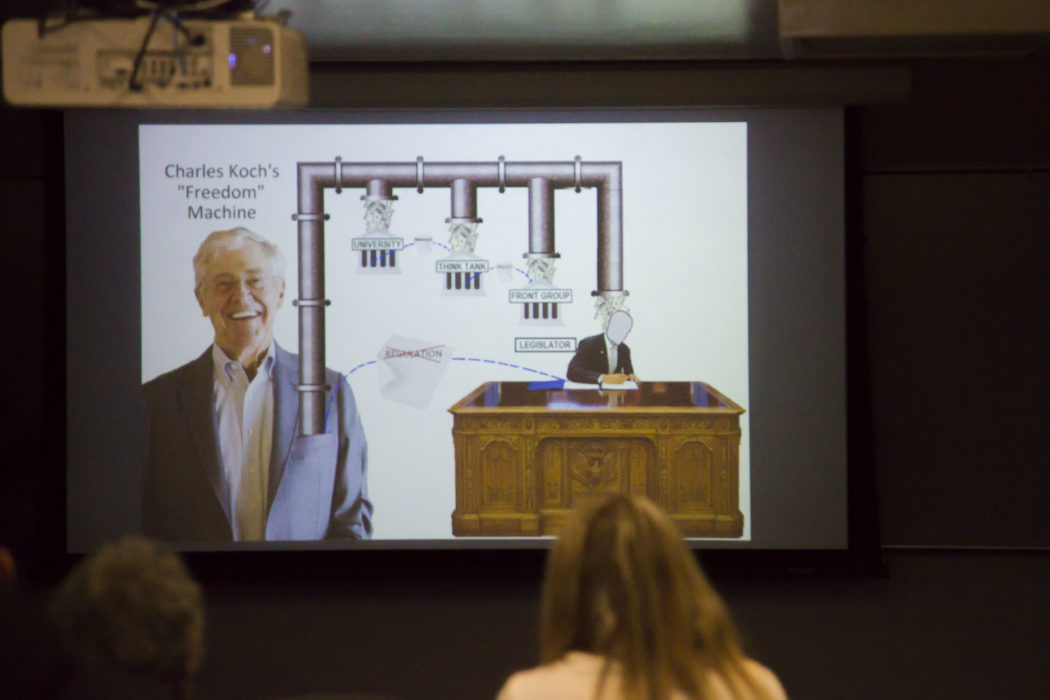UnKoch USU: Speaker voices concerns about 2017 Koch donation
Utah State University entered a deal that may seriously threaten academic freedom, argued Ralph Wilson, research director and cofounder of the advocacy group UnKoch My Campus, Tuesday evening.
Wilson was invited to speak at USU by the Student Organization for Society and Natural Resources. He and his group feel that by USU accepting the 2017 Charles G. Koch Foundation gift of $25 million, the university has accepted the strings that may be attached to the donation.
“The amount of donor influence that the Kochs exert is unique,” Wilson said.
Since 2007, the Charles G. Koch Foundation, started by the Kansas businessman who shares its name, has donated a total of $28.4 million to USU. This includes the joint gift with Jon M. Huntsman in 2017 which prompted student protests and responses from university administration. The USU Faculty Senate voted Feb. 5 to create a task force to monitor the funds from the donation.
“They are leveraging universities for political gain,” Wilson said. “They are actively training and recruiting students for this free market army that Charles Koch is creating.”
UnKoch My Campus began at Florida State University, which has received more than $2 million from the Koch Foundation. Wilson quoted a memo from the then Economics Department head of Florida State, Bruce Benson, who wrote to his staff that there are constraints on the donation, including censorship of graduate dissertations, stipulations on the hiring of faculty, and the advocacy for libertarian viewpoints at FSU.
“Not only does this memo reflect the view of Benson, but also reflects the donor’s understanding of what their intent was,” Wilson said, after saying that Benson sent the memo to the Koch foundation, and received confirmation of the goals he outlined.
Wilson said the donation to FSU gave the Koch’s power to hire and fire non-tenure track faculty, pick the chair of the department and create new programs and courses, none of which was made public to the students.
The group also found that the Koch Foundation had been exerting prior review on graduate students’ dissertation topics, of which Wilson said, “I honestly can’t think of a greater affront to academic freedom.”
Wilson was then asked if these prior review rights were typical of awarded grants.
“There is definitely right to the donor, and the donor has expectations,” he answered. “One of the huge differences here, is that this is curricular. This is about teaching courses, this is about hiring, this is about so many things that should never have strings attached.”
One audience member engaged Wilson in debate by saying UnKoch My Campus was anti-conservative, pointing out that they didn’t oppose gifts from liberal donors like George Soros. Wilson responded that his group had no political ideology behind it.
“We are not criticizing people who are donating to universities. We’re not criticizing people who have political opinions,” Wilson said. The group’s main concern is that a donation from the Koch Foundation gives donors powers, rights and privileges that should only be given to faculty and administration.
Wilson then talked specifically about the contract between the Koch Foundation and USU. He pointed out clause 9b, which states that the Koch Foundation has sole and absolute discretion to pull funding with as little as 30 days notice.
When asked what other examples he had specifically concerning USU’s relationships with the Koch Foundation, Wilson told a story of a time he visited a research symposium that featured students from the Huntsman business school at USU. He asked some students if they were going to publish their research in a peer-reviewed academic journal, and they told him no, that it was for a policy report, Wilson said
The research in question, he said, dealt with non-renewable energy and gave undue praise to the fossil fuel industry, in which the Koch’s are deeply ingrained.
Frank De Jong, the Student Organization for Society and Natural Resources club president, expressed concern that the Koch’s history of being “anti-environment regulation” might affect the College of Natural Resources. He said SOSNR is not only about the natural resources, but also about society as a whole, and thus feels the need to stand for academic rights.
“If a corporation is checking in on a college and making sure they are doing what they want, it impedes on the academic freedom of the university,” De Jong said.
—carter.moore@aggiemail.usu.edu
@carterthegrreat
Editor’s note: This article has been updated to clarify the intent of the student research on non-renewable energy.

